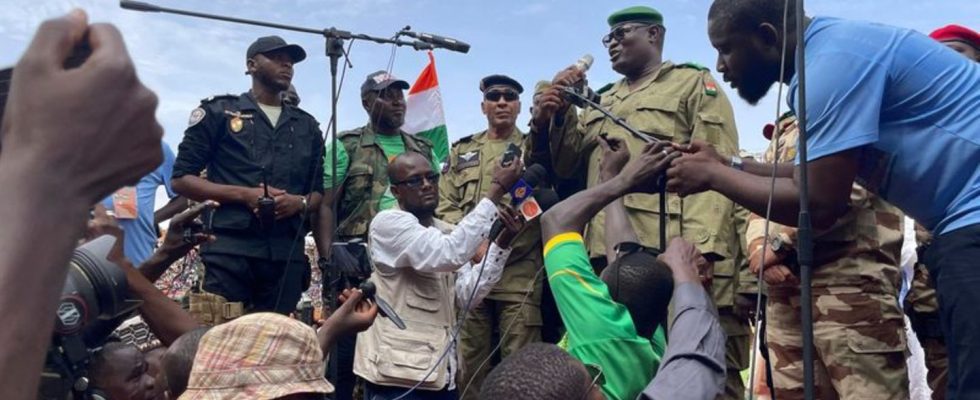West Africa
EU prepares sanctions against putschists in Niger
Mohamed Toumba, one of the soldiers who overthrew Nigerian President Mohamed Bazoum, addresses supporters of the Nigerian junta. photo
© Sam Mednick/AP/dpa
The military coups in African countries are causing unrest in the EU. Punitive measures against the military junta in Niger are now being prepared – regardless of possible negative consequences for the Bundeswehr.
Germany and France in particular had called for sanctions in the run-up to the EU meetings. According to diplomats in Brussels, they are to meet leading representatives of the military junta that has been in power since a coup. In addition, organizations that support the putschists could also be targeted.
Federal Foreign Minister Annalena Baerbock (Greens) said last week that what is happening in Niger affects all democratic countries in the world. If you simply look the other way when a democratically elected government is overthrown in a neighboring country or on another continent, then there is a risk of such a breach of the rules in other regions of the world as well.
EU calls for reinstatement of constitution
In July, officers of the Presidential Guard arrested President Mohamed Bazoum in Niger and declared him ousted. The commander of the Presidential Guard, General Abdourahamane Tiani, proclaimed himself the new ruler. Tiani recently announced that he would set up an interim government that would remain in office for up to three years. The EU and other African states, on the other hand, are calling for the old constitution and the ousted president, who is under house arrest, to be reinstated.
One reason for the initial reluctance to plan sanctions is that sanctions would probably have a negative impact on cooperation with Niger. The very poor country with around 26 million inhabitants has been an important partner of the EU in the fight against Islamist terrorism and illegal migration.
Bundeswehr in Niamey
In addition, numerous soldiers from EU countries are stationed in Niger. Germany still maintains a military airlift base in the capital, Niamey, through which the German armed forces are currently being withdrawn from West African Mali.
The base should continue to play a role, said Defense Secretary Siemtje Möller in Toledo. Around 100 German soldiers are still on site. However, Möller was positive about the sanctions debate. It is about building up pressure so that the democratically legitimized government is reinstated, said the SPD politician, who took part in the EU meeting on behalf of Defense Minister Boris Pistorius.
It was initially unclear when sanctions could be decided at the earliest. According to EU information, they would include EU entry bans, among other things. In addition, the assets of those affected in the EU would have to be frozen. Shortly after the coup, the EU announced that all previous EU support payments for Niger would be put on hold for the time being. However, it should be ensured that humanitarian aid remains possible.

